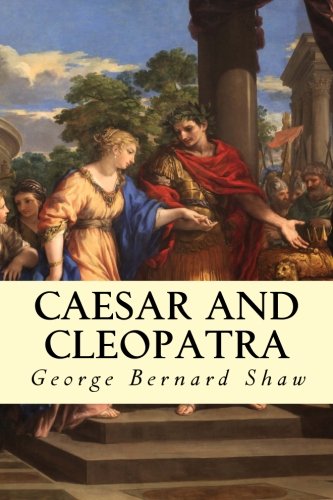Caesar and Cleopatra
George Bernard Shaw
Paperback
(CreateSpace Independent Publishing Platform, July 13, 2014)
Caesar and Cleopatra, a play written in 1898 by George Bernard Shaw, was first staged in 1901 and first published with Captain Brassbound's Conversion and The Devil's Disciple in his 1901 collection, Three Plays for Puritans. It was first performed at Newcastle upon Tyne on March 15, 1899. London production was at the Savoy Theatre in 1907. The play has a prologue and an "Alternative to the Prologue". The prologue consists of the Egyptian god Ra addressing the audience directly, as if he could see them in the theater (i.e., breaking the fourth wall). He says that Pompey represents the old Rome and Caesar represents the new Rome. The gods favored Caesar, according to Ra, because he "lived the life they had given him boldly". Ra recounts the conflict between Caesar and Pompey, their battle at Pharsalia, and Pompey's eventual assassination in Egypt at the hands of Lucius Septimius. In "An Alternative to the Prologue", the captain of Cleopatra's guard is warned that Caesar has landed and is invading Egypt. Cleopatra has been driven into Syria by her brother, Ptolemy, with whom she is vying for the Egyptian throne. The messenger warns that Caesar's conquest is inevitable and irresistible. A Nubian watchman flees to Cleopatra's palace and warns those inside that Caesar and his armies are less than an hour away. The guards, knowing of Caesar's weakness for women, plan to persuade him to proclaim Cleopatra—who may be controllable—Egypt's ruler instead of Ptolemy. They try to locate her, but are told by Cleopatra's nurse, Ftatateeta, that she has run away. Shaw wanted to prove that it was not love but politics that drew Cleopatra to Julius Caesar. He sees the Roman occupation of ancient Egypt as similar to the British occupation that was occurring during his time. Caesar understands the importance of good government, and values these things above art and love. Shaw's philosophy has often been compared to that of Nietzsche. Their shared admiration for men of action shows itself in Shaw's description of Caesar's struggle with Pompey.[citation needed] In the prologue, the god Ra says, "the blood and iron ye pin your faith on fell before the spirit of man; for the spirit of man is the will of the gods." A second theme, apparent both from the text of the play itself and from Shaw's lengthy notes after the play, is Shaw's belief that people have not been morally improved by civilization and technology.[citation needed] A line from the prologue clearly illustrates this point. The god Ra addresses the audience and says, "ye shall marvel, after your ignorant manner, that men twenty centuries ago were already just such as you, and spoke and lived as ye speak and live, no worse and no better, no wiser and no sillier." Another theme is the value of clemency. Caesar remarks that he will not stoop to vengeance when confronted with Septimius, the murderer of Pompey. Caesar throws away letters that would have identified his enemies in Rome, instead choosing to try to win them to his side. Pothinus remarks that Caesar doesn't torture his captives. At several points in the play, Caesar lets his enemies go instead of killing them. The wisdom of this approach is revealed when Cleopatra orders her nurse to kill Pothinus because of his "treachery and disloyalty" (but really because of his insults to her). This probably contrasts with historical fact.[3] The murder enrages the Egyptian crowd, and but for Mithridates' reinforcements would have meant the death of all the protagonists. Caesar only endorses the retaliatory murder of Cleopatra's nurse because it was necessary and humane.












